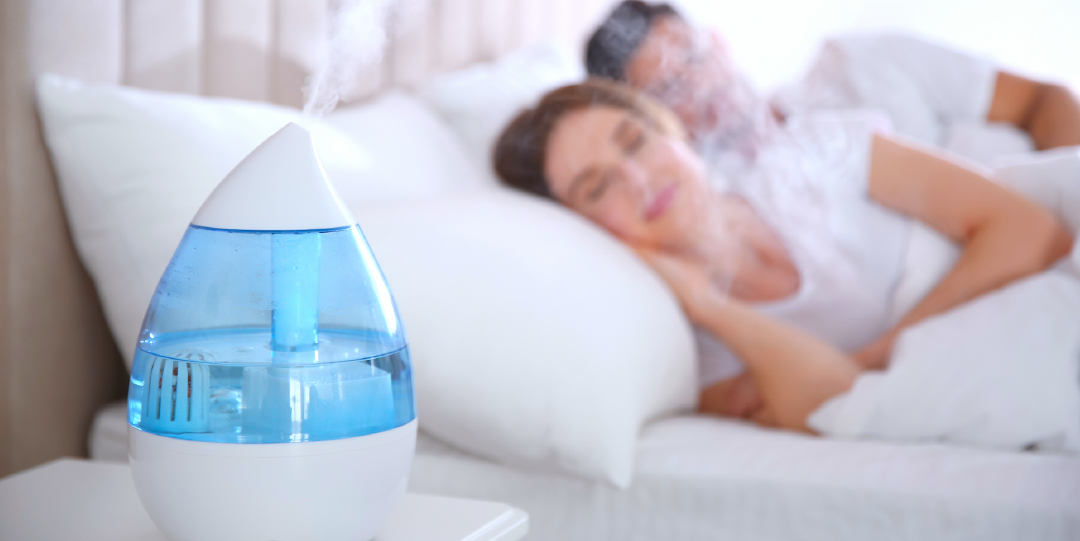Is Sleeping With a Humidifier Every Night Bad?
If you keep your humidity level between 30-50%, you might notice several health benefits, such as less dry skin, sinus problems, bloody noses, and cracked lips. If you’re struggling with a cold or congestion, keeping a humidifier in your room may also offer some relief. Especially during the winter months, the air can dry out your nasal passages, making it more difficult for the cilia to filter out bacteria, germs, dust, and pathogens and prevent them from entering your respiratory system.
Dry air also worsens snoring symptoms due to the mouth, nasal cavities, pallet, and airways getting dried out. Humidifiers release moisture into the air, which keeps the nasal and upper respiratory passages from getting too dry. This can help you breathe easier when you have a runny nose, chest congestion, cough, or sore throat.
Viruses and other infectious particles can survive longer and stay suspended longer in dry air. But, When humidity levels are higher, aerosol droplets expand faster, fall to the floor, and have less opportunity to be inhaled. Assuming you clean it regularly and keep humidity levels in the appropriate range, sleeping with a humidifier can provide you with multiple health benefits.
Should I Leave My Humidifier on All Night?
While sleeping with a humidifier can have a slew of health benefits, this is only if proper hygiene and guidelines are followed. The 30-50% humidity level mentioned above comes from the Environmental Protection Agency (EPA), and they note that going above that figure can bring about health issues.
Anything more might have the same impact as dry air and tighten your airways; air that’s too humid can trap allergens like pollen, dust, and dust mites, which can worsen asthma.
Water left sitting around in your humidifier can lead to the growth of bacteria, mildew, and mold, which can exacerbate allergy symptoms and even lead to respiratory problems. Insects and pests like roaches also prefer overly moist, humid environments, so on top of the health issues, too much humidity can invite unwanted guests.
A general rule of thumb is that it’s probably a sign to turn down the humidity if you see droplets forming. For more precision, you can use a hygrometer to keep an eye on the humidity levels in your home. If you keep this information in mind and stick to these guidelines, sleeping with a humidifier at night is a safe and healthy practice.
What Are the Different Types of Humidifiers?
Humidifiers can be divided into two main groups: cool mist humidifiers and warm mist humidifiers. Cool mist humidifiers tend to be either evaporative or ultrasonic. Meanwhile, warm mist humidifiers add moisture from boiling water through steam or water vapor to the air. Within these two main categories are several subcategories of humidifiers with different functions/methods of creating more humid air.
Cool mist humidifiers consist of ultrasonic humidifiers, evaporative humidifiers, and impeller humidifiers:
- Ultrasonic humidifiers use vibrations to release moisture into the air. They’re very quiet, and they’re a safe option for people with children or pets because they don’t use boiling water.
- Evaporative humidifiers use a fan to spread moisture, and they’re typically inexpensive. Additionally, evaporative humidifiers have a filter that helps keep bacteria and other adverse microorganisms out of the air.
- Impeller humidifiers send water into the air via a spinning disk, making a low humming noise (some people use this as a white noise machine). Impeller humidifier tanks need to be cleaned regularly to prevent the spread of unhealthy bacteria.
Warm mist humidifiers meanwhile come in two distinct subcategories:
- Steam vaporizers boil water to create steam and then release it into the air. Due to the water being boiled before being released, steam vaporizers tend to be the most hygienic humidifier. However, this also makes it more hazardous, as boiling water could be dangerous around children and pets.
- Central humidifiers are connected to your home’s central air conditioning/heating systems. There are different types of central humidifiers, but the most popular ones create steam distributed back into your home’s airflow.
The National Institutes of Health (NIH) recommends using a cool-mist humidifier to avoid the risk of burns and/or fires. A cool-mist humidifier might be the safest option if you have kids running around the house.
The last safety tip to keep in mind is, while any type of water is usually acceptable for most humidifiers, it’s best to use distilled water. Tap water and filtered water contain minerals that can cause bacteria growth in the tank. Using tap water is still okay; just clean the humidifier at least once a week.
Dr. Farizani and Hillcroft Physicians
So, is it healthy to sleep with a humidifier? If you monitor your home’s humidity levels, sleeping with a humidifier can bring many health benefits. However, if you’re someone with asthma or other respiratory problems, and sleeping with a humidifier hasn’t improved your condition, contact Dr. Farizani and the team at Hillcroft Physicians at 713-988-3921 to schedule an appointment.


